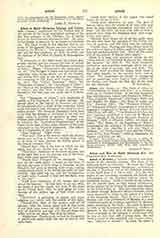

Adam in Early Christian Liturgy and Literature.—Adam‘s importance to the Fathers and to the authors of the many apocryphal writings of the first five centuries of the Christian Era is clearly shown by their frequent allusions to him. His place in the liturgy is, however, by no means a prominent one. His name occurs in the calendar, and in one hymn of the Eastern Church, nor does he fare much better in the Western. The sections which refer to him are the first prophecy on Holy Saturday and the readings of the Book of Genesis at Septuagesima time.
In literature, on the other hand, he is more generously treated, and has become the hero of several books, such as: “The Book of the Penance or Combat of Adam” (Migne, “Dictionnaire des apocryphes”, vol. II); “The Struggle of Adam and Eve which they underwent after being driven out of the Garden, and during their stay in the cave of treasures, by the command of The Lord their Creator” (Migne, op. cit.). The “Codex Nazaraeus” (ibid.); the “Testament of Adam“; the “Apocalypse of Adam“; the “Book of the Daughters of Adam“; the “Penance of Adam“, etc. also show to what an extent the memory of the first man was made use of in literature.
The “Testament of Adam“, now consisting of merely a few fragments, is of great interest. Its precise place in the history of literature can only be determined after a study of the connection which exists between it and writings of the same or of an earlier period. The liturgical fragments which have to do with the division of the hours of the day and night make it possible to perceive in what way Persian ideas influenced Gnosticism. Passages may be found in the “Apostolical Constitutions” of the Copts which seem to bear some relation to the ideas contained in the liturgical fragments. The following is a translation of one of them:—
“First fragment. Night hours.
“First hour: This is the hour in which the demons adore; and, so long as they are adoring, they cease to do harm to man, because the hidden power of the Creator restrains them.
“Second hour: This is the hour in which the fish adore, and all the reptiles that are in the sea.
“Third hour: Adoration of the lower abysses, and of the light that is in the abysses, and of the lower light which man cannot fathom.
“Fourth hour: Trisagion of the Seraphim. ‘Before my sin’ saith Adam ‘I heard at this hour, O my son, the noise of their wings in Paradise; for the Seraphim had gone on beating their wings, making a harmonious sound, in the temple set apart for their worship. But after my sin, and the transgression of God‘s order, I ceased to hear and see them, even as was just.’
“Fifth hour: Adoration of the waters that are above the heavens. ‘At this hour, O my son Seth, we heard, I and the angels, the noise of the great waves, lifting their voice to give glory to God, because of the hidden sign of God which moves them.’
“Sixth hour: A gathering of clouds, and great religious awe, which veils the middle of the night.
“Seventh hour: Rest of the powers, and of all natures, while the waters sleep; and at this hour, if one shall take water, let the priest of God mix holy oil therewith, and sign with this oil those who suffer, and do not sleep; they shall be healed.
“Eighth hour: Thanks given to God for the growth of plants and seeds, when the dew of heaven falls upon them.
“Ninth hour: Service of the angels who stand before the throne of God.
“Tenth hour: Adoration of men. The gate of heaven opens that the prayer of all that lives may enter in; they prostrate themselves, and then withdraw. At this hour all that man asks of God is granted him, when the Seraphim beat their wings or the cock crows.
“Eleventh hour: Great joy of all the earth when the sun rises from the paradise of the Living God over all creation, and lifts itself over the universe.
“Twelfth hour: Waiting and deep silence amid all the orders of light and spirits, until the priests shall have set perfumes before God. Then all the orders and all the powers of heaven draw apart.”
There is a long and important article on the “Liber Adami” by Sylvestre de Sacy in the “Journal des Savants” for 1819-20. The book condemns continence, and prescribes marriage; allows the eating of the flesh of animals, fish, and birds. The liturgical ritual provided for prayer three times a day: after sunrise, at the seventh hour, and at sunset. The Nazarenes are bound to almsgiving and to preaching, must baptize their children in the Jordan, and choose the first day of the week for the ceremony.
H. LECLERCQ

